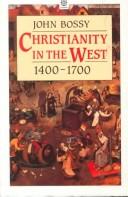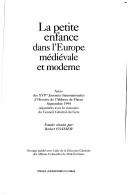| Listing 1 - 10 of 23 | << page >> |
Sort by
|

ISBN: 2130459129 9782130459125 Year: 1994 Volume: 4 Publisher: Paris: PUF,
Abstract | Keywords | Export | Availability | Bookmark
 Loading...
Loading...Choose an application
- Reference Manager
- EndNote
- RefWorks (Direct export to RefWorks)
Christian dogmatics --- anno 1200-1799 --- EGLISE CATHOLIQUE --- CONTRE-REFORME --- REFORME --- DOCTRINE, APOLOGIES, CONTROVERSES --- HISTOIRE --- 16E-17E SIECLES --- 15E-16E SIECLES --- 15E-18E SIECLES
Book
ISBN: 2130462006 9782130462002 Year: 1994 Volume: *6 Publisher: Paris Presses universitaires de France
Abstract | Keywords | Export | Availability | Bookmark
 Loading...
Loading...Choose an application
- Reference Manager
- EndNote
- RefWorks (Direct export to RefWorks)
History of France --- anno 1500-1799 --- France --- --1498-1789 --- --France --- Civilization --- History --- Civilisation --- Histoire --- France - Civilization --- FRANCE --- HISTOIRE --- 15E-18E SIECLES --- HISTOIRE RELIGIEUSE --- 14E-15E SIECLES
Book
ISBN: 0333614577 Year: 1996 Volume: *2 Publisher: Basingstoke Macmillan
Abstract | Keywords | Export | Availability | Bookmark
 Loading...
Loading...Choose an application
- Reference Manager
- EndNote
- RefWorks (Direct export to RefWorks)
Christian church history --- anno 1500-1799 --- anno 1400-1499 --- Germany --- Eastern and Central Europe --- 269*2 --- 398.3 --- Volksreligie. Volksgodsdienstigheid --- Volksgeloof. Volksgebruiken. Kalenderfeesten --- 398.3 Volksgeloof. Volksgebruiken. Kalenderfeesten --- 269*2 Volksreligie. Volksgodsdienstigheid --- Religious life and customs --- 1400-1800 --- Europe [Central ] --- VIE RELIGIEUSE --- EUROPE --- CHRISTIANISME --- ALLEMAGNE --- RELIGIONS --- HISTOIRE --- 15E-18E SIECLES

ISBN: 0192891626 9780192891624 Year: 1985 Publisher: Oxford Oxford University Press
Abstract | Keywords | Export | Availability | Bookmark
 Loading...
Loading...Choose an application
- Reference Manager
- EndNote
- RefWorks (Direct export to RefWorks)
A study not of the institution of the Church but of Christianity itself, this book explores the Christian people, their beliefs, and their way of life, providing a new understanding of Western Christianity at the time of the Reformation. Bossy begins with a systematic exposition of traditional or pre-Reformation Christianity, exploring the forces that tended to undermine it, the characteristics of the Protestant and Catholic regimes that superseded it, and the fall-out that resulted from its disintegration.
History of civilization --- Christian church history --- anno 1200-1799 --- Church history --- #SBIB:316.331H520 --- #SBIB:93H3 --- Geloofsopvattingen, houdingen en religieuze cultuur: algemeen --- Thematische geschiedenis --- Christianity --- Middle Ages, 600-1500 --- Church history - Middle Ages, 600-1500 --- Church history - 16th century --- CHRISTIANISME ET CIVILISATION --- CHRISTIANISME --- 600-1500 (MOYEN AGE) --- ESSENCE, ESPRIT, NATURE --- Eglise catholique --- Histoire --- Occident --- 15e-18e siecles
Book
ISBN: 3776203137 3776203412 Year: 1992 Publisher: Stuttgart Hauswedell
Abstract | Keywords | Export | Availability | Bookmark
 Loading...
Loading...Choose an application
- Reference Manager
- EndNote
- RefWorks (Direct export to RefWorks)
82-191 --- 839.3 "12" REINAERT --- Allegorische poëzie; fabels --- Nederlandse literatuur--?"12"--REINAERT --- 839.3 "12" REINAERT Nederlandse literatuur--?"12"--REINAERT --- 82-191 Allegorische poëzie; fabels --- Reynard the Fox (Legendary character) --- Poetry --- Bibliography --- Roman de renard --- Editions --- 15e-18e siecles --- Book history --- Literature --- Europe

ISBN: 2858163294 2810709203 9782858163298 Year: 1997 Volume: 16 Publisher: Toulouse Presses universitaires du Mirail
Abstract | Keywords | Export | Availability | Bookmark
 Loading...
Loading...Choose an application
- Reference Manager
- EndNote
- RefWorks (Direct export to RefWorks)
Se situant délibérément dans la longue durée, historiens des textes, spécialistes de l'iconographie, archéologues et anthropologues croisent leurs apports pour redonner vie à l'histoire de l'humanité qui, dénuée de parole, a été si longtemps privée d'histoire. Derrière les clichés qui s'effondrent, se révèle un univers enfantin qui nous paraît à la fois différent et étrangement familier.
Infants --- Mortality --- History of civilization --- anno 500-1499 --- Babies --- Infancy --- Children --- History --- Historische en vergelijkende pedagogiek. --- Enfants --- Congresses --- Histoire --- Congrès --- Europe --- Infants - Europe - History - Congresses --- Infants - Mortality - Europe - History - Congresses --- histoire --- enfance --- ENFANCE --- ENFANTS --- HISTOIRE --- MOYEN AGE --- 15E-18E SIECLES --- CONDITIONS SOCIALES

ISBN: 2728303622 9782728303625 Year: 1996 Volume: 220 Publisher: Rome Ecole française de Rome
Abstract | Keywords | Export | Availability | Bookmark
 Loading...
Loading...Choose an application
- Reference Manager
- EndNote
- RefWorks (Direct export to RefWorks)
History of Europe --- anno 1500-1799 --- Conspiracies --- Political violence --- Political crimes and offenses --- Conspiration --- Violence politique --- Crimes et délits politiques --- History --- Congresses --- Histoire --- Congrès --- Europe --- Politics and government --- Politique et gouvernement --- Conspiracy --- Congresses. --- -Crime --- Inchoate offenses --- Torts --- -Congresses --- Council of Europe countries --- Eastern Hemisphere --- Eurasia --- -Congresses. --- -History --- Crimes et délits politiques --- Congrès --- Crime --- Revolutions --- Insurgency --- Conspiracy - History - Congresses. --- EUROPE --- POLITIQUE ET GOUVERNEMENT --- HISTOIRE --- 15E-18E SIECLES
Book
ISBN: 9782503522708 250352270X Year: 2007 Volume: 11 Publisher: Turnhout Brepols
Abstract | Keywords | Export | Availability | Bookmark
 Loading...
Loading...Choose an application
- Reference Manager
- EndNote
- RefWorks (Direct export to RefWorks)
The importance of training and education is on the increase. While the production of human capital is seen as a motor for a competitive economy, skills and expertise proof to be necessary for social mobility. Remarkably, in conceiving modern forms of apprenticeship, several mechanisms from the acien régime, seem to return. The difference between public and private initiative is disappearing, education and training is being confused, and in order to acquire generic skills as flexibility, communicability, self-rule, creativity and so on, youngsters have to learn in context. Even for maths, scholars now talk of situated learning. Before the advent of a formal schooling system, training took place on the shop floor, under the roof of a master. The apprentice not only worked but also lived in his masters house and was thus trained and educated at the same time. In cities, this system was formally complemented by an official apprenticeship system, prescribing a minimum term to serve and an obligatory masterpiece for those who wanted to become masters themselves. Traditionally, historians see this as an archaic and backward way of training, yet this book?s aim is to show that is was instead a very flexible and dynamic system, perfectly in tune with the demands of an early modern economy. In order to understand it fully, however, we should differentiate the informal training system organised via a free market of indentures on the one hand and the institutionalised system of craft guilds on the other. In Antwerp, early modern guilds had a project of emancipating their members. They didn't simply produce certain skills, but through a system of quality marks defended the honour of craftsmen. This is the difference with current practices. By representing hands-on skills as superior, guilds supplied a sort of symbolic capital for workers.
History of Antwerp --- anno 1500-1799 --- Guilds --- Apprenticeship programs --- History. --- Compagnonnage --- --Métiers --- --Anvers --- --Histoire des techniques --- --XVe-XVIIIe s., --- History --- 338 <09> --- Economische geschiedenis --- 338 <09> Economische geschiedenis --- Corporations --- Apprentissage professionnel --- Histoire --- Craft guilds --- Gilds --- Labor organizations --- Merchant companies --- Workers' associations --- Artisans --- Employers' associations --- Labor unions --- Apprentices --- Apprenticeship --- Programs, Apprenticeship --- Employees --- Societies, etc. --- Training of --- Belgium --- Antwerp (Belgium) --- guilds --- apprenticeship --- Métiers --- Histoire des techniques --- XVe-XVIIIe s., 1401-1800 --- Guilds - Belgium - Antwerp - History --- Apprenticeship programs - Belgium - Antwerp - History --- Anvers --- Apprentis --- Apprentissage --- Anvers (Belgique) --- 15e-18e siècles

ISBN: 075465074X 9780754650744 Year: 2005 Volume: *11 Publisher: Aldershot Ashgate
Abstract | Keywords | Export | Availability | Bookmark
 Loading...
Loading...Choose an application
- Reference Manager
- EndNote
- RefWorks (Direct export to RefWorks)
Queens --- Marriages of royalty and nobility --- Power (Social sciences) --- History --- Spain --- History. --- History of Spain --- anno 500-1499 --- anno 1500-1799 --- Royalty --- Rulers --- Sovereigns --- Monarchy --- Women --- Courts and courtiers --- Empresses --- Kings and rulers --- Empowerment (Social sciences) --- Political power --- Exchange theory (Sociology) --- Political science --- Social sciences --- Sociology --- Consensus (Social sciences) --- Morganatic marriages --- Royal marriages --- Nobility --- Queens - Spain - History --- Marriages of royalty and nobility - Spain - History --- Power (Social sciences) - Spain - History --- Spain - History --- Catalina (reine de Castille et León ; 1372-1418) --- Isabelle I (reine de Castille ; 1451-1504) --- Isabelle de Portugal (impératrice germanique ; 1503-1539) --- Jean d'Autriche (1629-1679) --- Monarchie --- Reines --- Biographie --- Espagne --- Moyen âge --- 15e-18e siècles

ISBN: 2213592276 9782213592275 Year: 1998 Publisher: Place of publication unknown Fayard
Abstract | Keywords | Export | Availability | Bookmark
 Loading...
Loading...Choose an application
- Reference Manager
- EndNote
- RefWorks (Direct export to RefWorks)
Agriculture --- Rural development --- Développement rural --- History --- Histoire --- Ile-de-France (France) --- Rural conditions --- Conditions rurales --- Tenant farmers --- Sociale mobiliteit. --- Île-de-France (France) --- Conditions rurales. --- Boeren. --- Développement rural --- Farm tenancy --- Economic aspects --- History. --- Histoire. --- Economic conditions. --- History of France --- anno 1500-1799 --- anno 1400-1499 --- Tenant farmers - France - Ile-de-France - History. --- Farm tenancy - France - Ile-de-France - History. --- Agriculture - Economic aspects - France - Ile-de-France - History. --- Agriculture - France - Ile-de-France - History. --- FRANCE --- CONDITIONS SOCIALES --- 15E-18E SIECLES --- CONDITIONS ECONOMIQUES --- 16E-18E SIECLES --- AGRICULTURE --- HISTOIRE --- POPULATION
| Listing 1 - 10 of 23 | << page >> |
Sort by
|

 Search
Search Feedback
Feedback About UniCat
About UniCat  Help
Help News
News